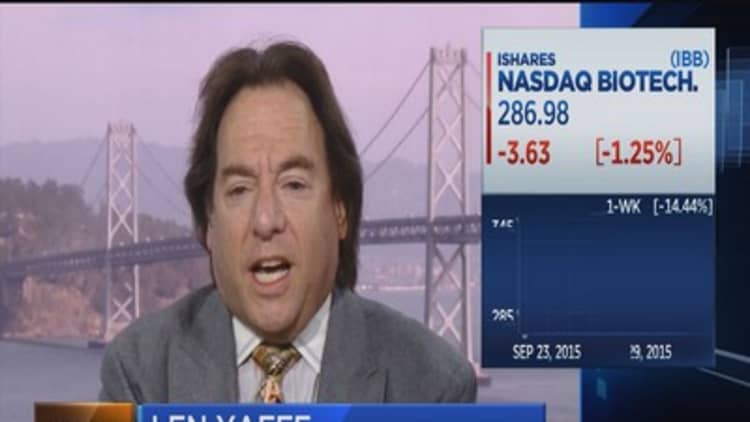
The iShares Nasdaq Biotechnology ETF saw its worst day since Aug. 4, 2011, on Tuesday and is on pace for its worst month since March 2001. However, one analyst remains bullish on biotech despite its recent fall.
Len Yaffe of Stoc*Doc Partners told CNBC's "Closing Bell" that investors can capitalize on opportunities to buy on this significant price decline.
"I think that the multiples have come down for the companies earning money from about 24 times next year's earnings to about 17-18 times, more in line with the S&P, more in line with major pharma," Yaffe said. "And I think there's several companies so specifically where I think the prospects are much better than the analysts expect."
Yaffe said that ETFs, which weren't around a decade ago, have incrementally exacerbated the biotech decline. On the other hand, ETFs have also caused rallies to be stronger, Yaffe added.
"So I think you've seen a lot of confusion in the market ... in this decline, trying to separate out what's real, from a drug-pricing standpoint, versus what probably isn't," he said. "And I think that's left a lot of opportunities down at the current level."
Yaffe named PCSK9 inhibitors, a class of drugs used to lower cholesterol, as a catalyst that will double expected revenues by 2020. Therefore, Yaffe added that he's very favorable towards shares of Regeneron, Amgen, Gilead and Juno.
"I look for areas of major unmet medical need, which I think now is in hepatology, nephrology and oncology, as well as areas where I think the companies or certain drugs will do far better than Wall Street analysts expect," he said.
The IBB closed down 0.39 percent Tuesday at 289.48, inching closer to it's 52-week low of 247.86.
— CNBC's Chris Hayes contributed to this report.






